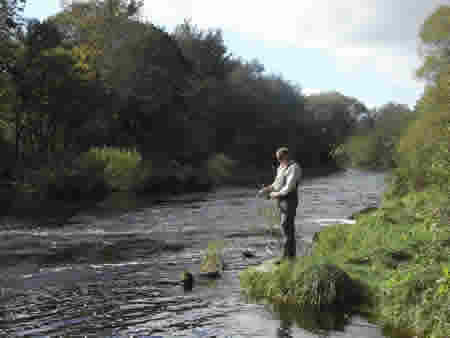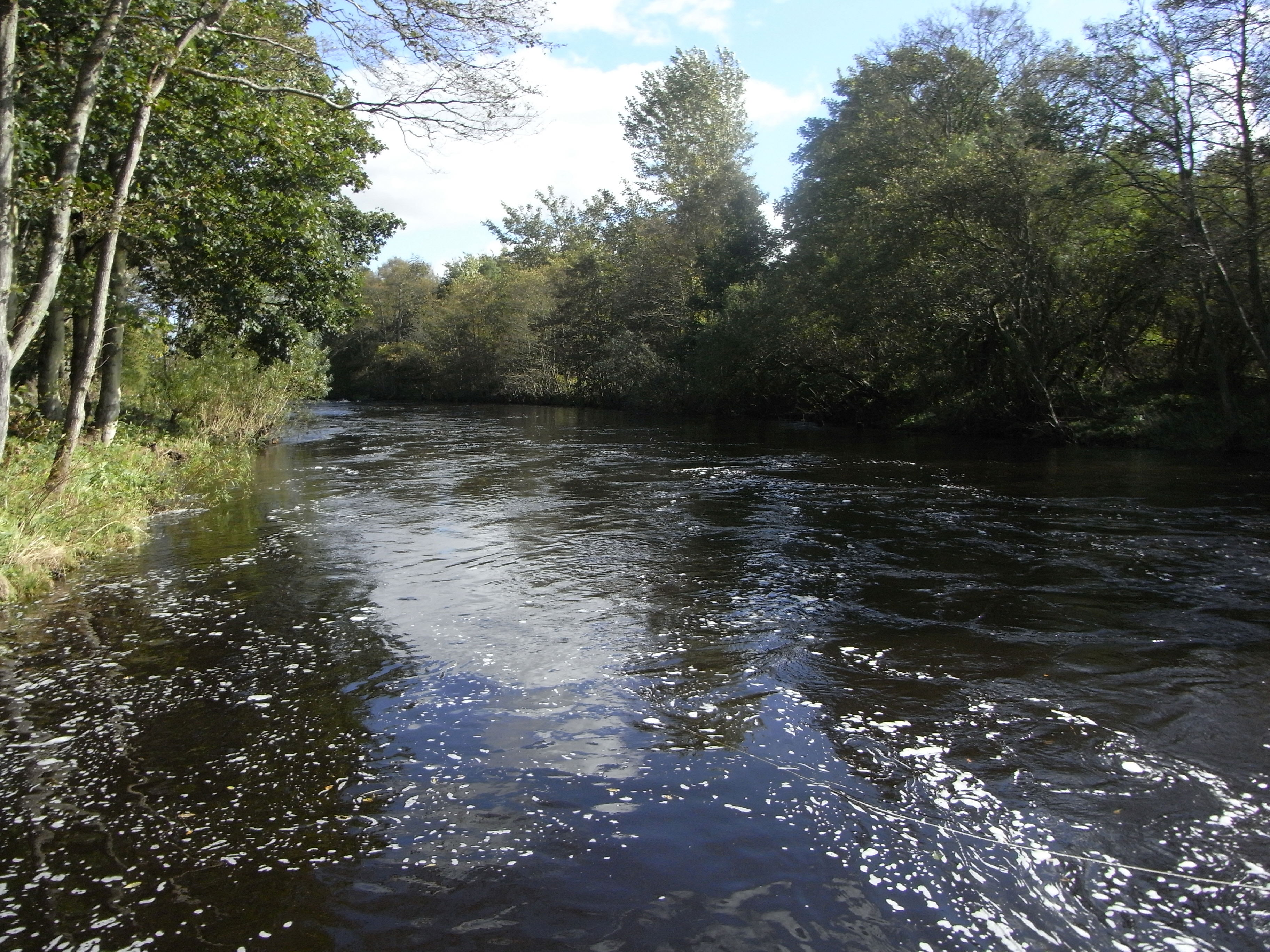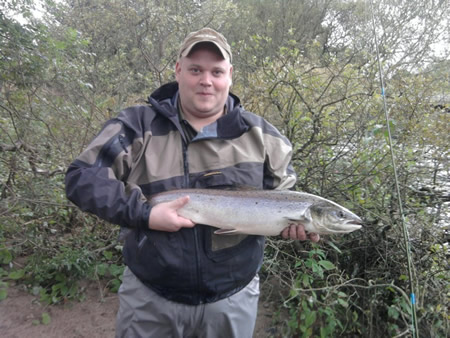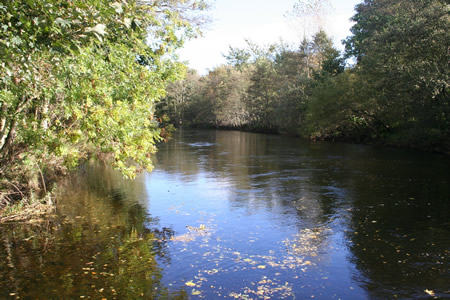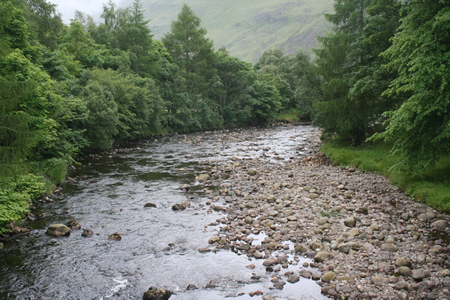These bulletin blogs represent news about Finavon and the South Esk, and my views as a riparian owner. They are not the views of any other organisation, nor are they designed to promote the interests of any individual or organisation other than Finavon Castle Water and factors affecting the fishery. Tony Andrews
Sunday night (25/9) saw black clouds looming over the Angus hills and, sure enough, the river was up 18″ and peaty this morning. Conditions will not be ideal for the fly until the suspended silts are deposited and the colour drains away. In these circumstances the most effective way to catch salmon is with a rapala or flying C, but I’m pleased to say the Graham Dutton’s party, who are fishing for the first half of the week, are all dedicated to using the fly. With drier weather and higher temperatures forecast they should have plenty of opportunities to fish the fly once the river settles back.
This is ‘Big Dave’ fishing Melgund Pool at a great height for a salmon in the best lie from the north bank (Indies Beat). In fact this pool fishes well all the way down, and right into the tail. It is a very good holding pool.
A local issue: is the South Esk “a problem”? The purpose of these bulletin blogs is mainly to keep our visiting fishers and anyone with an interest in Finavon and the South Esk updated. From time to time an issue comes up which I feel ought to be aired as part of that update. I am referring to an article in last week’s Courier newspaper in which it was asserted that “the South Esk is a problem”. The Fishery Board member quoted was referring to the perception that numbers of salmon returning to the South Esk, especially in the spring months, are cause for concern. I have said before in these bulletins that noone knows how many salmon enter the South Esk, unlike the North Esk which, as a marker river, has a government funded fish counter at Logie. So how does anyone conclude that “the South Esk is a problem” when they have no data to support that assertion? The problem for managers such as myself is that the bad press for the river that comes from comments, such as that quoted in the Courier, damages our businesses, and therefore reduces the amount of money to invest in habitat improvements.
The particular aspect of recent catches which appears to have prompted the claim that runs of salmon into the South Esk are “a problem” is the spring catch of May and June 2010, which happened to be one of the driest periods in recent years. If we are to judge whether or not stocks of salmon (and sea trout) in the South Esk are healthy on the basis of rod catches we are not going to get anywhere close to the reality of the composition and abundance of the river’s stocks of both species. There is wisdom in the words of the late Earnley Gilbert who regularly fished the South Esk when he said of salmon fishing here, “Nae water: nae fish”. The fact is that in very low water salmon catches drop away to virtually nil, however many salmon are in the pools. Using rod catches as the only measure to assess stocks is a crude and inaccurate instrument. But, using rod catch statistics intelligently, taking into account the prevailing conditions and corroborating other methods of assessment, is clearly helpful. You may want to look at my unscientific, and as yet unchallenged, assessment of South Esk stocks in the FCW bulletin of 14 June 2011.
Melgund is a deep holding pool where salmon have been seen in every month from March to October in both 2010 and 2011. The lower section of the pool holds sea trout, which can be caught here in low water at night, and salmon which can be caught at the level shown in the photograph above. Melgund is a long pool (about 250 yards) with a narrow and deep throat where the current is focussed along the north bank before spreading out into the main pool and then into the tail, which ends with the cauld (or RPJ) at the head of Frank’s Stream. It is a lovely pool to fish, the head from either bank, and the mid section and tail only from the south bank.
There is it seems a mild odour of conviction politics pervading this whole issue, which I feel prevents us assessing the South Esk’s stocks objectively. As a riparian owner and hands-on manager of a middle river fishery on the South Esk, I can say intuitively that the last two years (and I include the 2010 period in question, when few were caught!) have seen noticeably more salmon than in previous years. I do not present this as data, but purely the conclusion I have reached after detailed daily observation of the river at all times of the year. I don’t have the means of counting fish comprehensively or accurately, but I do take account of the declared Usan net catches and I do count the fish I see, as does one of my upstream neighbours. Our conclusion is that we should continue to take special care of the early running salmon because, probably caused by high levels of marine mortality, there is a nationwide shortage of MSW salmon returning in March, April and May. In that respect, and that one only, I support the fishery board policy to continue protecting our early running salmon. But, for the rest of the year, and I include sea trout here, there is absolutely no data that supports the assertion that the South Esk is “a problem”.
So, what is the “problem”? We only have one problem I suggest and that is “we haven’t the faintest idea of how many salmon (or sea trout) run the South Esk in a season, or how the stock is broken down into genetically distinct populations” (I quote myself because until we do have a much better idea what the South Esk’s stock comprises we should avoid making damaging statements about the river being “a problem”). Our priority for the South Esk must be to mount a major stock assessment project and put an end to the speculation. In the meantime I await a science-based challenge to the figures I postulated in my blog on 14 June!
TA
